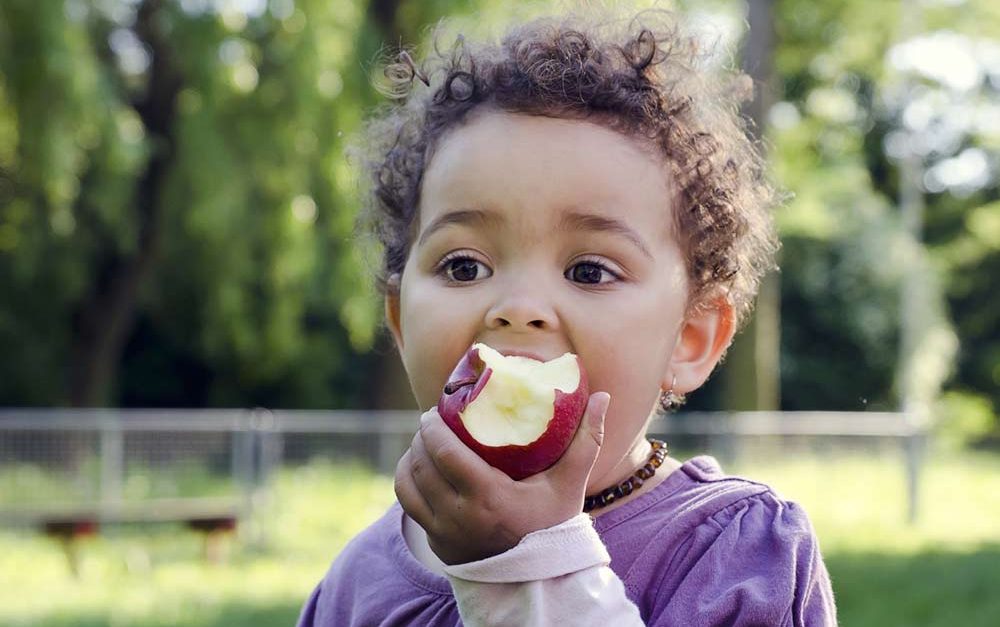A new study in Environmental Health Perspectives confirms that when children eat organic, the levels of pesticides in their bodies — including the brain-harming variety — go down.
A new study in Environmental Health Perspectives confirms that when children eat organic, the levels of pesticides in their bodies — including the brain-harming variety — go down. This seems a common-sense conclusion for many of us, but the more science we have to document the case, the better.
As we’ve discussed earlier in GroundTruth blogs, residues found on food are an important source of pesticide exposure for children. Earlier, smaller scale studies have also shown that switching to an organic diet reduces pesticide breakdown products in children’s bodies.
This new study, conducted by researchers at UC Berkeley, compares a larger group of children of similar ages and socio-economic backgrounds in rural and urban California cities — Salinas and Oakland — and the results confirm food as a source of kids’ pesticide exposure. Given what’s known about the impacts of low-level exposures to these chemicals, it also confirms the importance of doing something about it.
Toward healthier school food
Throughout the month of October, parents, teachers, farmers and “healthy school food” advocates are celebrating National Farm to School Month. This week is National School Lunch Week as well, and as we mark the exciting progress in these areas, it’s important to keep these pesticide studies in mind. If we’re serious about supporting the good health of children — it’s also National Children’s Health Month, after all — we must remember that pesticides have been linked to brain harm, autism, developmental delays and childhood cancers, among other health impacts.
And these child-harming chemicals are commonly applied to fruits and vegetables across the country.
Fruits and vegetables are of course core sources of nutrition for our children, and while we always wholeheartedly encourage eating fresh fruits and veggies, these studies underscore that the healthiest version for our kids will be organic or as close to pesticide-free as possible.
School lunches are a great place to start making this change, and it doesn’t need to break the bank. Just look at this example from Conscious Kitchen, an organization that converted the school lunch program in one school district in northern California to one that serves “Fresh, Local, Organic, Seasonal” and GMO-free food every meal at their school cafeterias. They produce meals from scratch at the schools throughout the district at an affordable average cost of $0.70 per meal for breakfast and $1.73 per meal for lunch.
Celebrating progress
National initiatives like Farm to School offer a proverbial win-win, helping to bring nutritious food to schools while supporting local farmers. Some of the Farm to School partnerships support organic farmers, putting their fresh, pesticide-free produce on cafeteria trays. We’re hoping that over time, this growing movement will focus even more on ensuring healthy, local, organic or pesticide-free foods are being served in schools across the country.
As I wrote in an earlier blog, several Minnesota and Wisconsin schools have already moved towards healthy and organic lunches, including extensive salad bars and as much organic food as possible. And initiatives, like those led by the Chef Ann Foundation, have helped to move thinking about school lunches towards healthier, more diverse menu options. In some school districts, like Berkeley, California, not only is pesticide-free food served whenever possible, but children are also encouraged to grow their own healthy produce in organic gardens.
There’s a lot of good work happening out there — it’s exciting! But as parents, we do need to roll up our sleeves and pressure our school districts to provide safer, pesticide-free school food for our children. Hopefully by the time next year’s National School Lunch Week rolls around we’ll have even more success stories to share!







